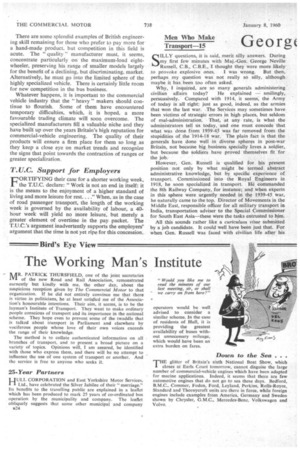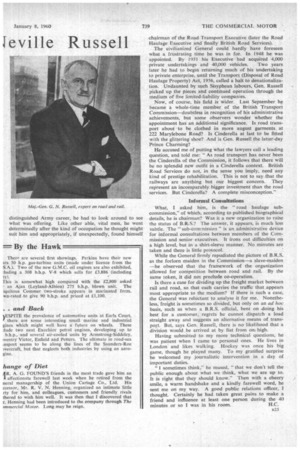Men Who Make Transport-15
Page 50

Page 51

If you've noticed an error in this article please click here to report it so we can fix it.
Georg(
feville Russell
SILLY questions, it is said, merit silly answers. During my first few minutes with Maj.-Gen. George Neville Russell, C.B., C.B.E., I thought they were more likely to provoke explosive ones. I was wrong. But then, perhaps my question was not really so silly, although maybe it has been too often asked. Why, I inquired, are so many generals administering civilian affairs today? He explained — smilingly, persuasively. Compared with 1914, it seems; the Army of today is all right: just as good, indeed, as the armies that won the last war. .The Services may sometimes have been victims of strategic errors in high places, but seldom of mal-administration. That, at any rate, is what the administrators tell us today, and one must concede that what was done from 1939-45 was far removed from the stupidities of the 1914-18 war. The plain fact is that the generals have done well in diverse spheres in post-war Britain, not because big business specially loves a soldier, but because the soldiers have proved themselves fit for the job. However, Gen. Russell is qualified for his present position not only by what might be termed abstract administrative knowledge, but by specific experience of transport. Commissioned into the Royal Engineers in 1918, he soon specialized in transport. He commanded the 8th Railway Company, for instance; and when experts in this sphere were urgently needed in the 1939-45 war, he naturally came to the top. Director of Movements in the Middle East, responsible officer for all military transport in India, transportation adviser to the Special Commissioner for South East Asia—these Were the tasks entrusted to him. All this sounds rather like a curiculurn vitae submitted by a job candidate. It could well have been just that. For when Gen. Russell was faced with civilian life after his
distinguished Army career, he had to look around to see what was offering. Like other able, vital men, he went determinedly after the kind of occupation he thought might suit him and appropriately, if unexpectedly, found himself chairman of the Road Transport Executive (later the Road Haulage Executive and finally British Road Services).
The civilianized General could hardly have foreseen what a frustrating time he was in for. In 1948 he was appointed. By 1951 his Executive had acquired 4,000 private undertakings arid 40,000 vehicles. Two years later he had to begin returning much of his undertaking to private enterprise, until the Transport (Disposal of Road Haulage Property) Act, 1956, called a halt to denationaliza. tion. Undaunted by such Sisyphean labours, Gen. Russell picked up the pieces and continued operation through the medium of five limited-liability companies.
Now, of course, his field is wider. Last September he became a whole-time member, of the British Transport Commission—doubtless in recognition of his administrative achievements, but some observers wonder whether the appointment has an additional significance. Is road transport about to be clothed in more august garments, at 222 Marylebone Road? Is Cinderella at last to be fitted with the glittering shoe? And is Gen. Russell the latter-day Prince Charming?
He accused me of putting what the lawyers call a leading question, and told me: "As road transport has never been the Cinderella of the Commission, it follows that there will be no splendid new outfit in a Cinderella context. British Road Services do not, in the sense you imply, need any kind of prestige rehabilitation. This is not to say that the railways are anything but our biggest concern. They represent an incomparably bigger investment than the road services. But Cinderella? A complete misconception."
Informal Consultations
What, I asked him, is the "road haulage subcommission," of Which, according to published biographical details, he is chairman? Was it a new organization to raise the status of B.R.S.? The answer, it appears, is much less subtle. The " sub-comrnission " is an administrative device for informal consultations between members of the Commission and senior executives. It irons out difficulties on a high level, but in a shirt-sleeve manner. No minutes are taken and there is little protocol.
While the General firmly repudiated the picture of B.R.S. as the forlorn maiden in the Commission—a slave-maiden —he observed that the framework of the organization allowed for competition between road and rail. By the same token, it did not preclude co-operation.
Is there a case for dividing up the freight market between rail and road, so that each carries the traffic that appears most appropriate to the medium? If there is such a case, the General was reluctant to analyse it for me. Nonetheless, freight is sometimes so divided, but only on an ad hoc basis, such as when a B.R.S. official, bent on doing his best for a customer, regrets he cannot dispatch a load straight away and suggests an alternative means of transport. But, says Gen. Russell, there is no likelihood that a division would be arrived at by fiat from on high.
Having submitted to my more technical questions, he was patient when I came to personal ones. He lives in London and likes walking. Hockey was once his big game, though he played many. To my gratified surprise he welcomed my journalistic intervention in a day of important duties.
"I sometimes think," he mused, "that we don't tell the public enough about what we think, what we are up to. It is right that they should know." Then with a cheery smile, a warm handshake and a kindly farewell word, he sent me on my way. A good public relations officer, I thought. Certainly he had taken great pains to make a friend and influence at least one person during the 40 minutes or so I was in his room. H.C.
























































































































































